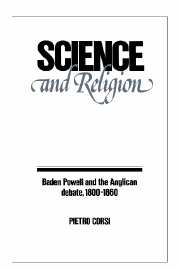Book contents
- Frontmatter
- Contents
- Preface
- List of abbreviations
- PART I
- Biographical introduction
- 1 The Hackney Phalanx: a family network
- 2 Baden Powell's early theological papers
- 3 Baden Powell's reflections on science in the early 1820s
- 4 Science and religion in the 1820s
- 5 Rational Religion Examined
- 6 Baden Powell between Oriel and Hackney
- PART II
- PART III
- PART IV
- Bibliography
- Index
4 - Science and religion in the 1820s
Published online by Cambridge University Press: 15 December 2009
- Frontmatter
- Contents
- Preface
- List of abbreviations
- PART I
- Biographical introduction
- 1 The Hackney Phalanx: a family network
- 2 Baden Powell's early theological papers
- 3 Baden Powell's reflections on science in the early 1820s
- 4 Science and religion in the 1820s
- 5 Rational Religion Examined
- 6 Baden Powell between Oriel and Hackney
- PART II
- PART III
- PART IV
- Bibliography
- Index
Summary
In Chapter 1 I examined the considerable effort made by the Hackney friends to alert the clergy and the Anglican intelligentsia to the necessity for a better understanding of theological issues, and particularly for a more serious commitment to the study of Anglican theology. However, the lack of a well-defined canon of Anglican doctrine and of a coherent grouping of professional theologians was reflected in the plurality of views expressed by the contributors to the British Critic, the journal controlled by the Hackney leaders. Agreement on a broad spectrum of political questions made theological differences a matter of secondary importance. Moreover, the absence at this time of any sustained attempt to develop a systematic approach to theological studies and doctrines made even more remote the possibility of clashes on purely theological issues. In the course of this study, it will become apparent how, with the outbreak of serious political contention within the High Church party, theological differences tended to come to the forefront of the tense debates which characterized the late 1820s and the early 1830s.
The lack of agreement on several points of crucial theological relevance (in particular on the character and extent of the divine inspiration of the Bible) had obvious and important effects on the solutions put forward in the British Critic regarding the relationship between science and the scriptures. A survey of reviews on scientific subjects published in the magazine during the 1810s and the early 1820s reveals that suspicions about the actual or potential danger of scientific inquiry from the religious point of view were voiced along with firm reassurances as to the intrinsic safety of natural and physical researches.
- Type
- Chapter
- Information
- Science and ReligionBaden Powell and the Anglican Debate, 1800–1860, pp. 49 - 60Publisher: Cambridge University PressPrint publication year: 1988



